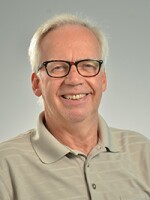Pellom McDaniels, a former Kansas City Chiefs defensive lineman who went on to become a college professor, poet and author, has died. He was 52.
McDaniels was known for applying the best of his abilities to whatever endeavor he tackled, including opposing running backs.
“I have worked extremely hard to make sure that all my i’s were dotted and t’s were crossed,” McDaniels told Gina Kaufmann during a 2018 interview on KCUR's Central Standard.
McDaniels, the curator of African-American collections at Emory University in Atlanta, was speaking to Central Standard then on the occasion of the publication of his novel “The Hemp Breakers."
McDaniels, a California native, played collegiate football at Oregon State University but went undrafted. He first came to Kansas City in 1992 after he was signed by the Chiefs as a free agent after playing in the now-defunct World League of American Football.
With the Chiefs, McDaniels was a situational lineman who earned the respect of Chiefs president and general manager Carl Peterson.
“There’s no finer citizen,” said Peterson during a luncheon address during the 1998 season. Peterson also had an appreciation for McDaniels’s entrepreneurial spirit.
McDaniels's first book, “My Own Harlem,” was published while he was still playing in the NFL. It was a collection of poetry, essays and short stories. A short time later, he published “So, You Want to be a Pro?," a self-help guide for young athletes aspiring to a professional career in sports. (Full disclosure: McDaniels asked me to edit the book.)
When talking about his novel, “The Hemp Breakers,” on KCUR’s Central Standard two years ago, he spoke about his interest in pursuing obscure stories in African-American history.
“I couldn’t find a publisher for it, which is why I had to go with a small press,” said McDaniels. “I had two different agents and they said, ‘I don’t know how to sell this.’”
But he went out and did it anyway.
One of his favorite places in Kansas City was the Negro Leagues Baseball Museum. At one time he was one of its board members. Whenever he came back to Kansas City, he said it was one of he places he always wanted to return to as a visitor and former resident.



